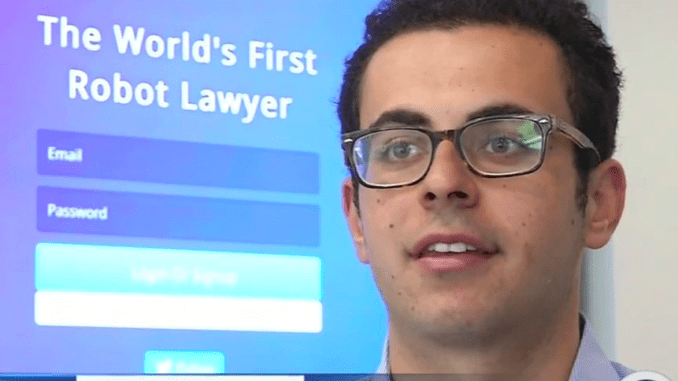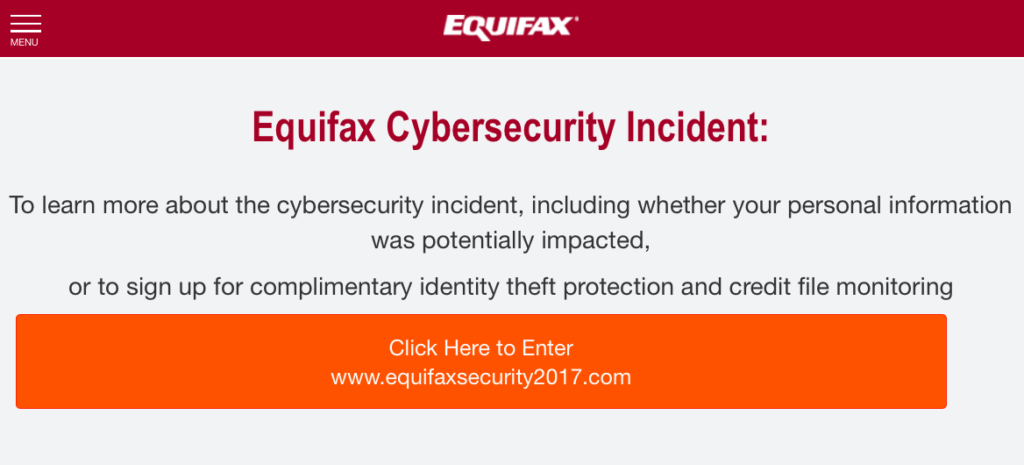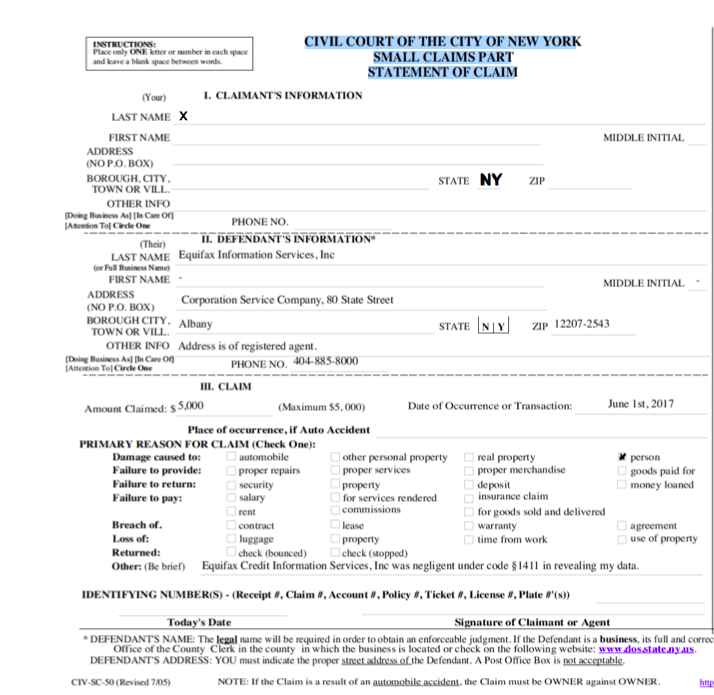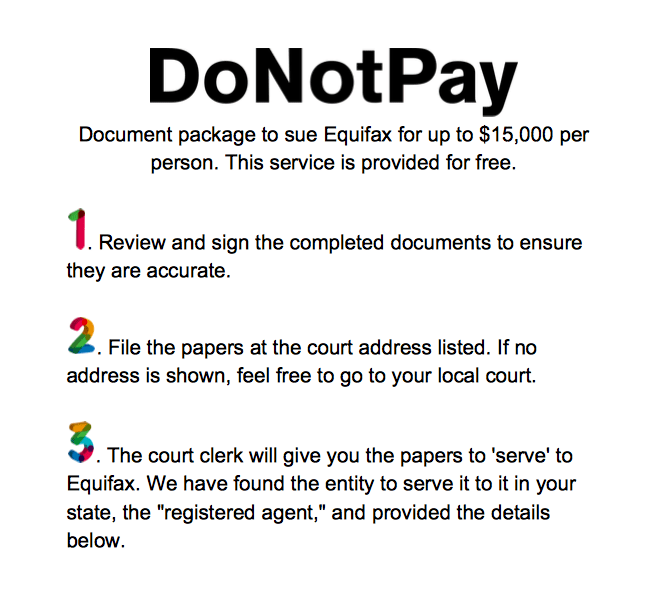
As many readers will know already, Joshua Browder, the British tech pioneer based at Stanford University and founder of the DoNotPay legal bot, has launched an application to help people sue US company Equifax for a massive data breach that exposed personal details of tens of millions of people.
He was quoted by US tech site the Verge as saying: ‘I hope that my product will replace lawyers, and, with enough success, bankrupt Equifax.‘

Given the popular excitement about ‘robot lawyers’ the story has gone viral with many people applauding the way that justice is being done without the need for those pesky lawyers getting in the way.
The story seems to combine several themes: the fascination with AI and automation; the opportunity to punish a major corporate that has (it would appear) behaved badly; and to get justice without recourse to expensive and difficult lawyers. In short, a Hollywood script is probably imminent.
And even after the story has fizzled out, some commercial lawyers will no doubt be left wondering if this legal tech pioneer and his chat bot really are the future. Maybe he’s right? Maybe DoNotPay and similar apps will soon replace lawyers? One can certainly bet this example will be presented on a thousand PowerPoint slides for years to come at legal conferences around the planet as evidence that the legal world is kaput.
But, what does this all mean? Is DoNotPay really about to replace lawyers?
What Is DoNotPay Doing?
The legal bot, or simply chat bot, is a web-based interface that has a pre-programmed script that asks questions, such as name, address and so forth, that allows you to start making a range of claims. Its most famous and original focus was revoking parking tickets by helping you to fill in a form that would overturn those type of fines.
The Equifax claim app is very similar. The bot asks you some basic personal information, which it kindly inserts into the small claims form that you require dependent upon where you live, in this case, which US state.
It then simply tells you to go to your local small claims court and give them the claim form, providing any other information that the clerk may demand. You may then, and most likely will have to, attend a court hearing. Depending on the state and other conditions a maximum sum will be set. In New York, for example this will be $5,000. In other states it may be higher.

After you have got your form you’re on your own. The bot provides a cut and paste of the small claims court procedures, but it’s all down to you to make the claim, provide any information beyond what you supply for the form, attend the hearing in person and then you have to wait to see if Equifax will pay up. That is the extent of it.
If Equifax doesn’t pay….well. You may need to talk to a lawyer….
Is This Really Removing or Replacing Lawyers?
Did DoNotPay remove lawyers from the process of making a small claim? The simple answer is: No.
The bot did not replace a lawyer’s input because in most scenarios a small claim of $5,000 would not involve a lawyer. Moreover, governments and court systems around the world have created small claims courts specifically to allow citizens to make small civil claims without needing a lawyer.
I.e. this application could only exist because of many hours of work on the part of lawyers and bureaucrats to create the facility to make claims without needing a lawyer present.
The same may be said for the ability to overturn a parking ticket. Local government officials created an easy means for people to reject and revoke a fine by creating a simple form to fill in and telling you where to send it to. I.e. the pathway to justice was already there, even if not everyone knew it was there.
So, What is DoNotPay Actually Doing?
What is DoNotPay actually doing? Where is it adding value? How is it helping access to justice? The answer is that the bot is ‘facilitating’ access to ‘lawyerless’ justice functions that ironically lawyers and governments have created.
Artificial Lawyer mulled over how best to describe what this bot does for some time and concluded that one way to classify its benefits is to say it is a ‘Justice Sign-Posting System‘, i.e. it does the initial steps for you, it gets you over the line, it moves you from someone who is angry about something to someone who now feels able to make a small claim.
One could perhaps also call it a ‘Justice Empowerment System‘, because it seeks to make access to justice, well…..accessible and to make you feel you can do something.
What DoNotPay is really doing therefore is taking what is already there, e.g. the small claims court and saying to people: ‘Look, you can use this to get some justice. Also, to help you on your way we’ll help you fill out the initial legal form to get you started.’

What Does This Mean for Lawyers?
First, it doesn’t replace or remove lawyers – yet – because none were ever going to be part of a small claim in any case. The larger and much higher value class actions that are now launching across the US, as well as the criminal probes by various legal bodies and agencies into the massive data loss, will all be carried along by lawyers as usual.
In short, the legal world has been helped. DoNotPay has filled a gap in the way that justice is delivered, by helping people to access systems lawyers put in place to allow such claims to be made.
Browder is in effect acting as a promoter and cheerleader for access to justice channels created long ago in an analogue world. No one has been replaced. But, fundamentally, DoNotPay is widening access to justice through this ‘promotional’ activity, and that is no small thing.
What Browder is doing is showing that ‘legal work’ can be partly automated, though others such as Rocket Lawyer and LegalZoom with their downloadable forms with instructions on how to fill them in have already been here for some time. And now we have a wide variety of other bots that help you to complete legal docs, from NDAs to property finance forms. But, equally, this is legal work that often does not really need a lawyer.
In the short term it’s hard to see lawyers being impacted by this. What will be more challenging is where legal bots eat into work that lawyers really would like to do, i.e. work that they see as ‘worth their time’ and where people would pay a significant amount for that time.
In the case of a small claim no lawyer is going to get involved. A $5,000 claim that needed a couple of hours of time to help fill in the form and explain the process, then attendance at court, sending follow up letters to Equifax to make sure the payment was carried out and so on…..all for 20% of the damages, is never going to catch on. Hence small claims courts were created by the justice system.
The Future
What is most interesting about this story is two-fold: that people are so incredibly excited about tech-assisted legal claims, even when that assistance is relatively small; and secondly, where this can go next.
What is perhaps most worrying for lawyers is not that this replaces them – yet – , but that people clearly like the idea of conducting legal claims (and other areas of legal work) without the need for a lawyer. Let’s face it, the people don’t love lawyers and seem to leap at anything that promises legal help without lawyers involved. That is something all Bar organisations should mull over.
Luckily for lawyers in this case, it’s rather a false positive, i.e. no lawyers were needed anyway, but in the future more complex systems will develop. And then work that lawyers DO want to keep will start to be captured by bots.
The issue then is if the profession fights back and says this is ‘unauthorised practice of law’, which is likely once the bots get sophisticated enough to do more than form filling.
Conclusion
On one level what Browder has done is quite straightforward and without using anything that one would call ‘AI’ or any other advanced tech. A pre-set chat bot Q&A routine, a form that gets filled in, some cut and pasted instructions from a local small claims court, is not world-shattering tech. But…..
….what Browder has done is brought it all together, he’s publicised it, he’s got people engaged, he’s helped people feel they can do something about getting justice.
To conclude, this seems to be far less about technology and any kind of ‘robot lawyer’ and more about someone who feels passionately about justice doing a brilliant job encouraging other people to get justice for themselves too. And that has to be a good thing.
Add in some more advanced tech and who knows where this may go.
3 Trackbacks / Pingbacks
Comments are closed.